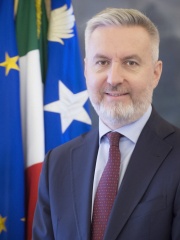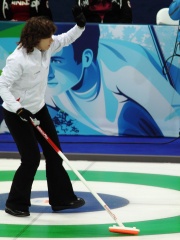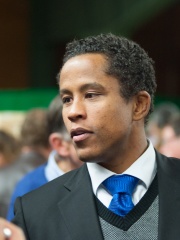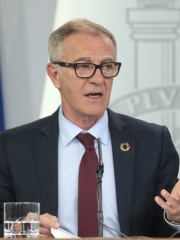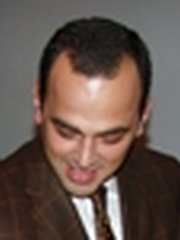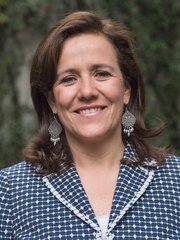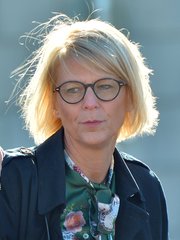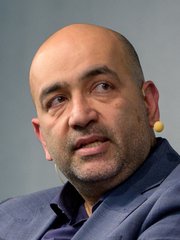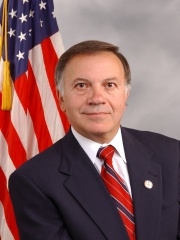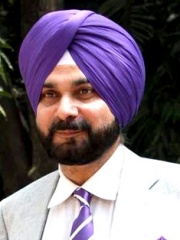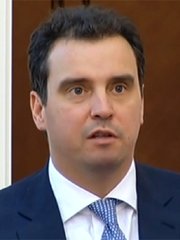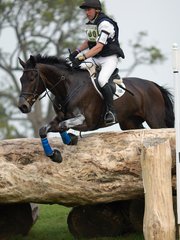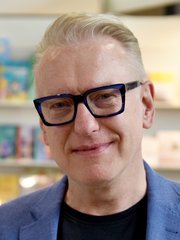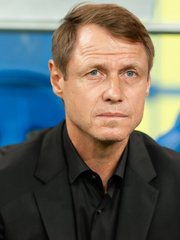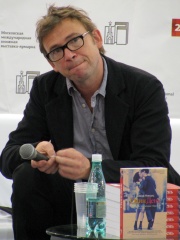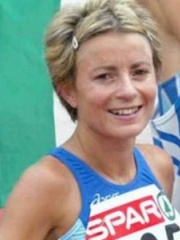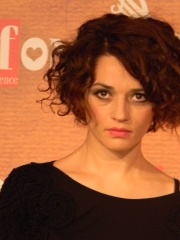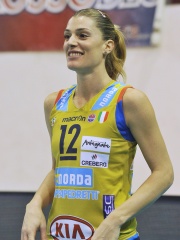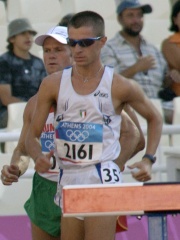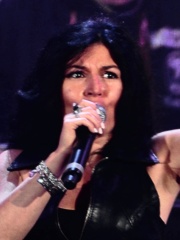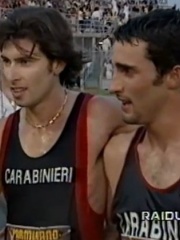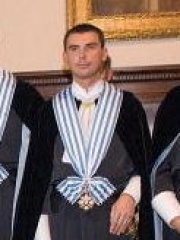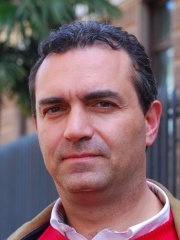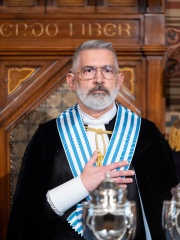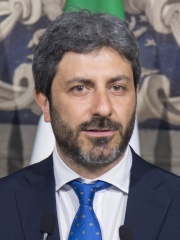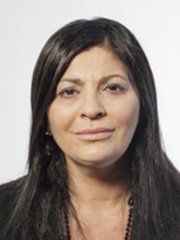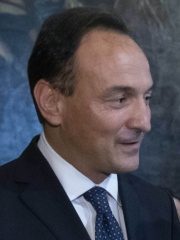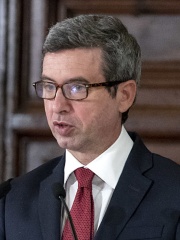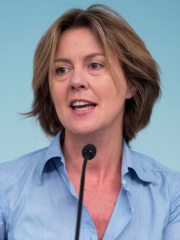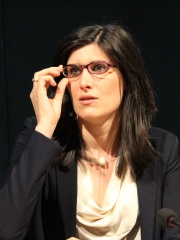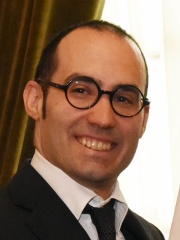Politician
Lorenzo Guerini
1966 - today
EN.WIKIPEDIA PAGE VIEWS (PV)
 Lorenzo Guerini
Lorenzo Guerini
His biography is available in 16 different languages on Wikipedia. Lorenzo Guerini is the 18,973rd most popular politician (down from 18,549th in 2024), the 4,739th most popular biography from Italy (down from 4,618th in 2019) and the 941st most popular Italian Politician.
Memorability Metrics
Page views of Lorenzo Guerini by language
Among Politicians
Among politicians, Lorenzo Guerini ranks 18,973 out of 19,576. Before him are Samppa Lajunen, Mirjam Ott, Sergei Aschwanden, José Guirao, Levan Varshalomidze, and Margarita Zavala. After him are Elisabeth Svantesson, Omid Nouripour, Tom Tancredo, Joram van Klaveren, Navjot Singh Sidhu, and Aivaras Abromavičius.
Most Popular Politicians in Wikipedia
Go to all RankingsSamppa Lajunen
1979 - Present
HPI: 44.41
Rank: 18,974
Mirjam Ott
1972 - Present
HPI: 44.41
Rank: 18,975
Sergei Aschwanden
1975 - Present
HPI: 44.41
Rank: 18,976
José Guirao
1959 - 2022
HPI: 44.40
Rank: 18,977
Levan Varshalomidze
1972 - Present
HPI: 44.39
Rank: 18,978
Margarita Zavala
1967 - Present
HPI: 44.39
Rank: 18,979
Lorenzo Guerini
1966 - Present
HPI: 44.38
Rank: 18,980
Elisabeth Svantesson
1967 - Present
HPI: 44.37
Rank: 18,981
Omid Nouripour
1975 - Present
HPI: 44.37
Rank: 18,982
Tom Tancredo
1945 - Present
HPI: 44.36
Rank: 18,983
Joram van Klaveren
1979 - Present
HPI: 44.34
Rank: 18,984
Navjot Singh Sidhu
1963 - Present
HPI: 44.33
Rank: 18,985
Aivaras Abromavičius
1976 - Present
HPI: 44.33
Rank: 18,986
Contemporaries
Among people born in 1966, Lorenzo Guerini ranks 886. Before him are Ismo Falck, Andreas Dibowski, Islam Dugushiev, Jyrki Järvi, Mariusz Szczygieł, and Susan Lee. After him are Oleg Kononov, Niall Quinn, Nigel Martyn, David Nicholls, Javier García, and Juan Vizcaíno.
Others Born in 1966
Go to all RankingsIsmo Falck
ATHLETE
1966 - Present
HPI: 44.44
Rank: 880
Andreas Dibowski
ATHLETE
1966 - Present
HPI: 44.43
Rank: 881
Islam Dugushiev
WRESTLER
1966 - Present
HPI: 44.40
Rank: 882
Jyrki Järvi
ATHLETE
1966 - Present
HPI: 44.39
Rank: 883
Mariusz Szczygieł
WRITER
1966 - Present
HPI: 44.38
Rank: 884
Susan Lee
ATHLETE
1966 - Present
HPI: 44.38
Rank: 885
Lorenzo Guerini
POLITICIAN
1966 - Present
HPI: 44.38
Rank: 886
Oleg Kononov
SOCCER PLAYER
1966 - Present
HPI: 44.37
Rank: 887
Niall Quinn
SOCCER PLAYER
1966 - Present
HPI: 44.37
Rank: 888
Nigel Martyn
SOCCER PLAYER
1966 - Present
HPI: 44.36
Rank: 889
David Nicholls
WRITER
1966 - Present
HPI: 44.34
Rank: 890
Javier García
ATHLETE
1966 - Present
HPI: 44.34
Rank: 891
Juan Vizcaíno
SOCCER PLAYER
1966 - Present
HPI: 44.33
Rank: 892
In Italy
Among people born in Italy, Lorenzo Guerini ranks 4,740 out of NaN. Before him are Michele Monti (1970), Simone Padoin (1984), Annarita Sidoti (1969), Anna Valle (1975), Giacomo Gianniotti (1989), and Carmen Consoli (1974). After him are Marco Bezzecchi (1998), Francesca Piccinini (1979), Ivano Brugnetti (1976), Giusy Ferreri (1979), Michele Serena (1970), and Giovanni De Benedictis (1968).
Others born in Italy
Go to all RankingsMichele Monti
MARTIAL ARTS
1970 - 2018
HPI: 44.45
Rank: 4,734
Simone Padoin
SOCCER PLAYER
1984 - Present
HPI: 44.44
Rank: 4,735
Annarita Sidoti
ATHLETE
1969 - 2015
HPI: 44.43
Rank: 4,736
Anna Valle
ACTOR
1975 - Present
HPI: 44.40
Rank: 4,737
Giacomo Gianniotti
ACTOR
1989 - Present
HPI: 44.40
Rank: 4,738
Carmen Consoli
SINGER
1974 - Present
HPI: 44.39
Rank: 4,739
Lorenzo Guerini
POLITICIAN
1966 - Present
HPI: 44.38
Rank: 4,740
Marco Bezzecchi
RACING DRIVER
1998 - Present
HPI: 44.37
Rank: 4,741
Francesca Piccinini
VOLLEYBALL PLAYER
1979 - Present
HPI: 44.35
Rank: 4,742
Ivano Brugnetti
ATHLETE
1976 - Present
HPI: 44.30
Rank: 4,743
Giusy Ferreri
SINGER
1979 - Present
HPI: 44.28
Rank: 4,744
Michele Serena
COACH
1970 - Present
HPI: 44.27
Rank: 4,745
Giovanni De Benedictis
ATHLETE
1968 - Present
HPI: 44.27
Rank: 4,746
Among Politicians In Italy
Among politicians born in Italy, Lorenzo Guerini ranks 941. Before him are Alessandro Mancini (1975), Luigi de Magistris (1967), Paolo Rondelli (1963), Roberto Fico (1974), Jole Santelli (1968), and Mario Mauro (1961). After him are Alberto Cirio (1972), Andrea Orlando (1969), Beatrice Lorenzin (1971), Anna Cappellini (1987), Chiara Appendino (1984), and Nicola Renzi (1979).
Alessandro Mancini
1975 - Present
HPI: 45.87
Rank: 935
Luigi de Magistris
1967 - Present
HPI: 45.42
Rank: 936
Paolo Rondelli
1963 - Present
HPI: 45.18
Rank: 937
Roberto Fico
1974 - Present
HPI: 45.05
Rank: 938
Jole Santelli
1968 - 2020
HPI: 44.55
Rank: 939
Mario Mauro
1961 - Present
HPI: 44.49
Rank: 940
Lorenzo Guerini
1966 - Present
HPI: 44.38
Rank: 941
Alberto Cirio
1972 - Present
HPI: 43.32
Rank: 942
Andrea Orlando
1969 - Present
HPI: 42.45
Rank: 943
Beatrice Lorenzin
1971 - Present
HPI: 42.14
Rank: 944
Anna Cappellini
1987 - Present
HPI: 40.45
Rank: 945
Chiara Appendino
1984 - Present
HPI: 40.08
Rank: 946
Nicola Renzi
1979 - Present
HPI: 39.48
Rank: 947
